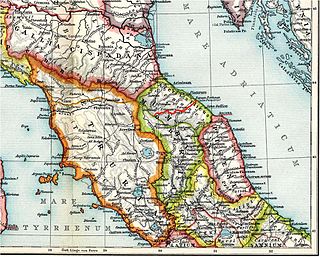Related Research Articles

This article concerns the period 49 BC – 40 BC.
This article concerns the period 79 BC – 70 BC.

Marcus Furius Camillus was a Roman soldier and statesman of the patrician class. According to Livy and Plutarch, Camillus triumphed four times, was five times dictator, and was honoured with the title of Second Founder of Rome.

The First, Second, and Third Samnite Wars were fought between the Roman Republic and the Samnites, who lived on a stretch of the Apennine Mountains south of Rome and north of the Lucanians.

Lucius Aemilius Paullus Macedonicus was a two-time consul of the Roman Republic and a noted general who conquered Macedon, putting an end to the Antigonid dynasty in the Third Macedonian War.
Lucius Julius Caesar was a Roman politician and senator who was elected consul of the Roman Republic in 64 BC. A supporter of his cousin, the Roman dictator Gaius Julius Caesar, Lucius was a key member of the senatorial coalition which strove to avoid civil war between the Roman Senate and his nephew Marcus Antonius in the aftermath of Caesar's assassination in 44.
Lucius Aemilius Papus was a Roman general and statesman. He jointly commanded the Roman armies which defeated the Gauls at the Battle of Telamon in 225 BC; his co-Consul, Gaius Atilius Regulus was killed during the battle. Papus was honoured with a triumph for this victory. He subsequently held several senior positions. He belonged to the patrician gens Aemilia.

Quintus Caecilius Metellus was a pontiff in 216 BC, aedile of the plebeians in 209 BC, curule aedile in 208 BC, magister equitum in 207 BC, consul in 206 BC, dictator in 205 BC, proconsul of Bruttium in 204 BC, and an ambassador at the court of Philip V of Macedon in 185 BC.
Gaius Atilius Regulus was one of the two Roman consuls who fought a Celtic invasion of Italy in 225-224 BC; he was killed in battle and beheaded. Atilius came from a prominent family of consuls for four generations; the family originally hailed from southern Italy.
The Roman–Volscian wars were a series of wars fought between the Roman Republic and the Volsci, an ancient Italic people. Volscian migration into southern Latium led to conflict with that region's old inhabitants, the Latins under leadership of Rome, the region's dominant city-state. By the late 5th century BC, the Volsci were increasingly on the defensive and by the end of the Samnite Wars had been incorporated into the Roman Republic. The ancient historians devoted considerable space to Volscian wars in their accounts of the early Roman Republic, but the historical accuracy of much of this material has been questioned by modern historians.
Lucius Furius Medullinus, of the patrician gens Furia, was a politician and general of the Roman Republic who was consul twice and Consular Tribune seven times.
Lucius Aemilius Mamercinus Privernas was a Roman statesman who served as the consul in 341 and 329 BC, Magister Equitum in 342, Dictator in 335 and 316, and Interrex in 326.
Gaius Plautius Venox was a Roman statesman and general who served as consul in 347 and 341 BC. Plautius was a member of the family of the Plautii, a relatively undistinguished plebeian gens who had only achieved their first consulship in 358 BC. Plautius' father and grandfather were both named Lucius and may have had a son named Gaius, who was the father of Gaius Plautius Venox, Censor in 312 BC.
Gaius Sulpicius Peticus was a prominent fourth century Roman politician and general who served as consul five times and as dictator once. Sulpicius was a member of the gens Sulpicia, a prominent patrician family which had attained the consular dignity a great number of times since the foundation of the republic. The familial relationship between Sulpicius and other known contemporary members of the gens is unknown however, with the only things known about his heritage being that his father was named Marcus and his grandfather was named Quintus.
Lucius Papirius Crassus was a Roman politician. He was appointed dictator in 340 BC, and consul in 336 BC and 330 BC. Lucius Papirius was from the Papiria gens (family) in Rome.
Gaius Julius Iulus was a member of the Roman gens Julia, and was nominated dictator in 352 BC.

The Battle of Silva Litana was an ambush during the Second Punic War that took place in a forest 75 miles northwest of the Roman city of Ariminum in 216 BC. The Gallic Boii surprised and destroyed a Roman army of 25,000 men under the consul-elect Lucius Postumius Albinus. Only ten men escaped the ambush, few prisoners were taken and Postumius was killed, decapitated and his skull covered with gold by the Boii. News of the military disaster, coming either several days or months after the defeat at Cannae, triggered a renewed panic in Rome and the Romans postponed military operations against the Gauls until the conclusion of the Second Punic War.
Lucius Lucretius Tricipitinus Flavus was a Roman statesman and general who had a prominent career in the early 4th century BC, serving once as consul, and four times as consular tribune, as well as perhaps serving as Princeps senatus.
Lucius Aemilius Mamercinus was a Roman politician and general who, in the early 4th century BC, held the office of consular tribune an extraordinary six times in his distinguished, yet mostly unknown, career.
References
- ↑ Livy, V, 34-35
- ↑ Fasti Triumphales